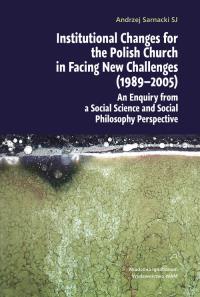
Institutional Changes for the Polish Church in Facing New Challenges (1989-2005)
An Enquiry from a Social Science and Social Philosophy Perspective
-
Autor: Sarnacki Andrzej
- ISBN: 9788327700049
- EAN: 9788327700049
- Oprawa: Miękka
- Wydawca: WAM
- Format: 15.5x23.5cm
- Język: angielski
- Liczba stron: 338
- Rok wydania: 2013
- Wysyłamy w ciągu: niedostępny
-
Brak ocen
-
21,52złCena detaliczna: 34,00 złNajniższa cena z ostatnich 30 dni: 21,52 zł
This dissertation deals with the important, intersecting, but also controversial, realms of Church, politics and culture, pointing out challenges that the Catholic Church in Poland has been facing since 1989. The purpose of this work is to present the pattern and ways of responding. The work is done primarily from a social sciences perspective enriched by conceptual tools from organizational theories. The recommendations are also rooted in socio-philosophical and theological principles. The conceptual framework therefore, has a strongly praxis-orientated and interdisciplinary character. In many aspects it enters new dimensions, combining quite different views. It shows that the author is well embedded into the theme, with a sound knowledge of manifold literatures and critical standpoints. The considerations contain many valuable and discussion-worthy incitements to reflection. Prof. Johannes Müller, Hochschule für Philosophie, Munich The work poses the question of "Polish exceptionalism", outlining one Church with many unknowns and no fewer antagonisms, a Church that has been brought along the path to plurality, with new choice possibilities, in the new information society, one globalized world, a single nascent society with growing polarization. Once passive and persevering Polish society was shifted from the communist system to a liberal market economy. New challenges of liberal vs. conservative, non-compliant vs. hierarchical or respectable vs. scandalous, demand accurate answers. New, presumably complex, conducts are to be formulated from the global perspective. Phenomena like secularisation, democracy, participation in the project of modernisation, need to be understood within the context of economic changes. The challenge comes with new generations, which contest their own tradition that has always plays a twofold role. Prof. Norbert Brieskorn, Hochschule für Philosophie, Munich

